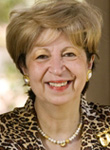Islam has long history of female scholarship and gender equality, former ambassador says
By Elisabeth Rosen

Many people believe that Islam debases women -- yet the religion has a long history of female scholarship and gender equality, said Sallama Shaker, a former ambassador from Egypt to Canada and advocate of women's rights in the Muslim world, speaking on campus Nov. 18.
"Women's achievements in the Muslim world seem to be a well-kept secret," Shaker said, speaking in Goldwin Smith Hall and hosted by Cornell's Islamic Alliance for Justice and Committee for the Advancement of Muslim Culture. "We all watch on TV oppressed women in Afghanistan, and this is a very sad reality. When we look to the Quranic text, we realize that many of these texts have been misinterpreted."
In the early days of Islam, Shaker said, women were educated alongside men. She laid out several examples: The wife of Mohammed was a scholar and wrote several accounts of Mohammed's practices after his death. The daughter of the first caliph owned the first copy of the Quran. Public funds were monitored by Muslim women.
"Islamic history emphasizes that there were at least 2,500 extraordinary women narrators and women poets," Shaker said.
These days, women have stood beside men fighting for independence in such places as Egypt, Algiers and Tunisia. Yet the image of the progressive Muslim woman fighting for change has yet to gain a foothold in Western media, she said.
"Why has the West failed in understanding women's role as agents of change in many Muslim societies?" Shaker asked.
She expressed frustration that opinions on the issue are evolving so slowly. In Egypt in the 1920s, she said, women gave lectures on having equal status in the workforce and ending violence toward women. "Here we are in 2011," Shaker said, "still debating these issues and wondering what went wrong in Muslim society."
Shaker suggested that the reason for this is lack of understanding of the Quranic texts and misinterpretation by Muslims as well as outsiders. This leads many women to miss out on an education, so that they never discover -- as she did -- the rich history of female scholarship in Islam.
"Without being educated, women miss their abilities to read all their rights," Shaker said.
As the first woman in the history of Egypt's Foreign Ministry to be appointed as assistant minister of foreign affairs for the Americas, Shaker has emphasized the importance of education for Arab women. Her first role model was Helen Keller, who visited her Egyptian girls' school in the early 1960s.
"It was one of the best and most inspirational days in my life," said Shaker, noting that "the best and most beautiful things in this world cannot be seen or even touched. They must be felt within the heart. Since that day, I realized that if Helen Keller can reach out, then I can too."
She urged audience members to reach out in the same way.
"We should never be the silent majority," she said. "It's very easy to sit back in class and never say a word. ... You are the generation of the Internet, and the truth is that the world has no borders. If we are to create a world where social justice can prevail, then the writing's on the wall. Educate the women, and you educate the whole society. You are the leaders of tomorrow, and you can make the world turn around with a magic touch."
The talk was funded in part by Student Assembly Finance Commission, the Women's Resource Center and the Perkins Prize.
Elisabeth Rosen '12 is a writer intern for the Cornell Chronicle.
Media Contact
Get Cornell news delivered right to your inbox.
Subscribe